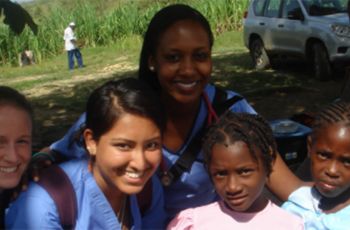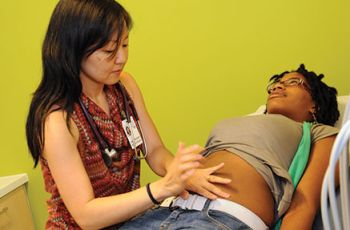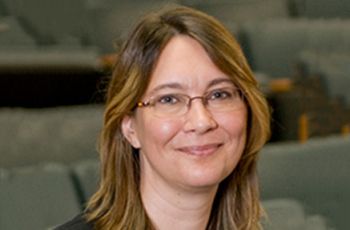Featured News
One out of every 88 children in the United States will develop autism sometime during the first three years of life, according to the Centers for Disease Control and Prevention.
In August, The George Washington University (GW) School of Medicine and Health Sciences (SMHS) received three federally funded research project grants (R01s) and one federally funded cooperative agreement research project grant (U01).
Students, faculty, and alumni from SMHS, the School of Public Health and Health Services, and the School of Nursing saw more than 1,100 patients and treated everything from malnutrition and respiratory issues in children to adults with diabetes, arthritis, and hypertension, during a medical mission…
The 1960s was an era of social change, a time when a number of medical corpsmen were returning home from the Vietnam War searching for a way to re-enter the medical practice arena.
Change can be a good thing, especially at the George Washington University student-run Healthcare, Education, and Active Living Clinic (HEALing Clinic), where new plans are being put in place that promise more than just healing. The clinic is in the process of launching new initiatives, expanding…
For most people it’s not uncommon, after a busy week or a long day of strenuous work or exercise, to fall asleep a little earlier than usual. It’s often a one-time thing and following a good night of sleep they return to their normal routine. For a small segment of the population, however, it’s a…
Marcia Firmani understands the importance of mentorship for budding scientists. During her graduate training at UC Berkeley, Daniel A. Portnoy, Ph.D., a professor of biochemistry, played an influential role in encouraging her dissertation research. “He once told me that there are two kinds of…
“Is this going to be on the final?” Mykia Washington eagerly asked her instructor during a fierce round of math Jeopardy. It’s an unusual question to hear from the mouth of a 14-year-old on a mid-summer morning, the sun already beating down on a sweltering Foggy Bottom.
Anyone who has taken a course in higher education is familiar with end-of-semester evaluations. They typically come in the form of surveys that employ Likert scales, which score responses along a range that spans from “strongly agree” to “strongly disagree.” Students are presented with statements…
Historically minorities have been underrepresented in the science and research fields. Looking to offer more educational opportunities and increase the number of underrepresented minority (URM) students considering research as a career path, the Clinical and Translational Science Institute at…






